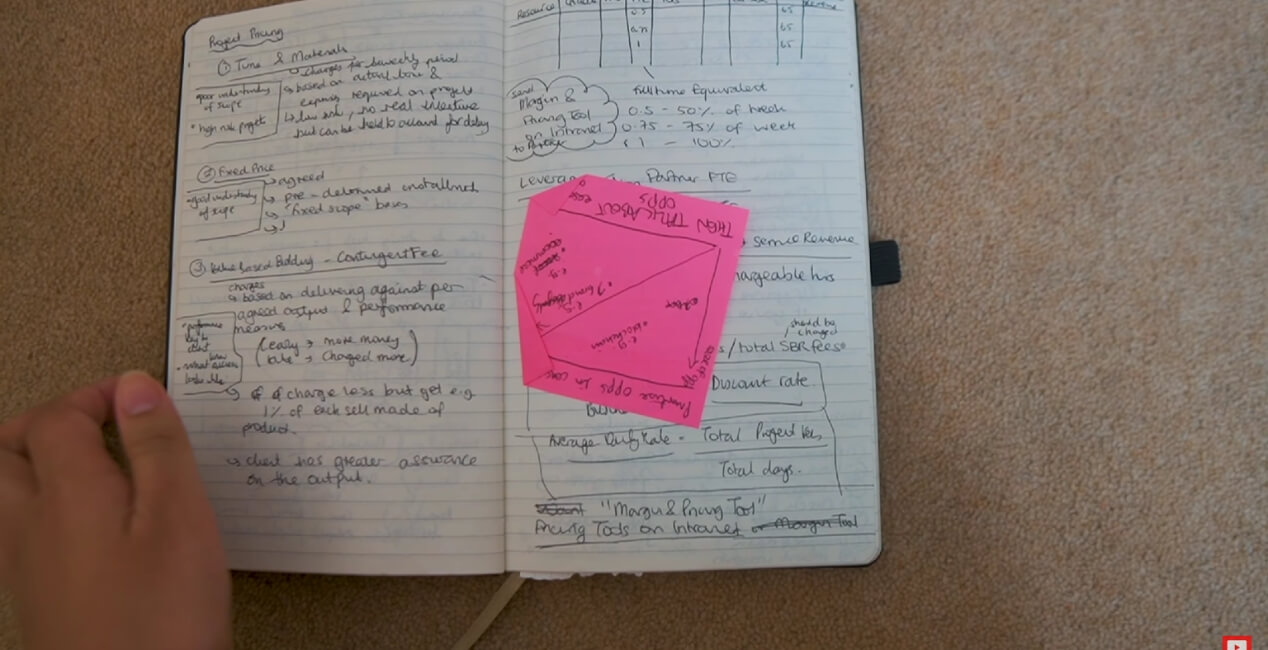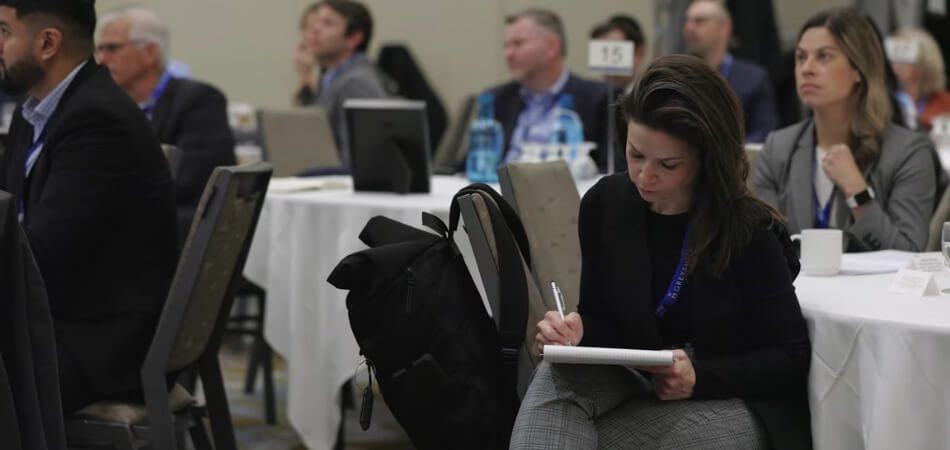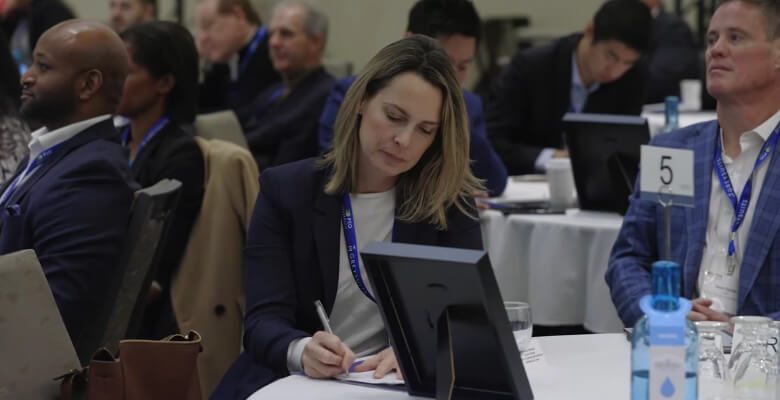A conference is an exciting opportunity to gain insight from experts in your field, learn new things, and network. However, with so much valuable information being shared, it’s crucial to know what are the best ways to take notes during a conference.
The best ways to take notes during a conference include selecting a method that suits you, using pen and paper, avoiding direct copying, utilizing note templates, assigning a note-taker, and employing recording software for accurate transcription.
Follow the rest of this article to learn more about note-taking and strategies so that you are able to make the most of your conference experience and improve your note-taking skills.
What Does Taking Note At Conference Mean?
Attending conferences can provide valuable knowledge and networking opportunities to professionals. Taking effective notes during a conference is key to making the most of your experience. Well-organized notes help you remember important insights and information, and they also serve as useful references for the future.

Conference notes are summaries of presentations and discussions that capture the most important points, ideas, and action items. Effective note-taking, especially at an international medical conference, ensures that essential information is accurately recorded. This approach helps you understand and apply knowledge more effectively.
Choosing a note-taking method that fits your style is important. Many people prefer using pen and paper because it helps them focus and minimizes distractions from digital devices. However, digital tools can also be valuable for organizing and sharing notes, making them accessible and easy to review.
Templates can greatly improve how you organize your notes. By using templates, you can easily follow up on what you’ve learned, as they provide clear sections for key points and action items. Additionally, having a well-planned note taking strategy at a conference, such as recording sessions for later review, can further improve how you retain and apply new knowledge.
What Are the Best Ways to Take Notes During a Conference?
Learning and networking opportunities are invaluable at conferences. Effective note-taking is essential for retaining the information shared during sessions. Here are the best ways to take notes during a conference to maximize your learning experience.
Choosing a Suitable Method
Selecting the right note-taking method is crucial for effective learning. Some prefer digital tools, while others find pen and paper more effective. Your choice should match your style and the conference setting. Trying different methods beforehand can help you find the best fit.
Using Pen and Paper
Many attendees find using pen and paper to be highly effective. This method reduces distractions from digital devices and helps improve focus. Writing by hand can help in better memory recall. It’s a simple, reliable method that works well in most situations.
Avoiding Exact Copying
Trying to copy everything exactly is not efficient. Instead, focus on capturing key points and essential information. Summarize the main ideas in your own words to increase understanding. This approach helps you engage more deeply with the content.
Using a Notes Template
A notes template can provide a structured way to capture information. Templates help you organize thoughts under clear headings like key points, action items, and questions. This structure makes reviewing notes easier later. Find upcoming conference templates online to help prepare.
Assigning a Note-Taker
In group settings, assigning a specific note-taker can be very beneficial. This ensures comprehensive coverage of discussions and presentations. Having a designated note-taker reduces the chances of missing important details. It allows others to focus on engaging with the content.
Using Recording Software
Taking notes with recording software can be very useful. It allows you to capture entire sessions for later transcription. This ensures accuracy and completeness in your notes. Combining recordings with written notes can provide a robust record of the event.
Effective note-taking during a conference can vary based on your goals and conference attendance motivation. Whether you’re attending to learn new skills, network, or stay updated on industry trends, your note-taking method should align with your objectives.
What to Include in a Conference Notes Format?
Taking effective notes during a conference is crucial for retaining and utilizing the information presented. A structured conference notes format ensures you capture all key details. Here’s a complete guide on what to include in your conference notes format.
Title and Date of the Conference
Start your notes with the conference title and date. This provides a clear context for when and where the information was gathered. It helps you organize and reference your notes later. Always ensure this is at the top of your page.
Speaker Information
Include the speaker’s name and their credentials. Knowing who delivered the information adds credibility and context. Note their main points and any quotes that stood out. This helps in attributing ideas and follow-up.
Key Points and Themes
Summarize the main points and themes discussed. Focus on the core messages of each session. Highlight any repeating themes or important trends. This gives you a concise overview of the conference content.
Action Items and Follow-Ups
Identify actionable items and follow-ups from the discussions. These could be tasks, ideas to implement, or people to contact. Mark these to differentiate them from general notes. This ensures you act on what you’ve learned.
Questions and Clarifications
Note any questions that arise during the sessions. These might be questions you have or questions asked by others. Include clarifications provided by the speaker. This helps in understanding the content more deeply.
Visual Aids and Diagrams
If any visual aids or diagrams were used, make a note of them. Draw simplified versions or describe them in your notes. Visuals can help in better understanding and recalling information. They provide a quick reference to complex ideas.
A well-structured conference notes format helps you retain and utilize information efficiently. By organizing key details, action items, and visual aids, you can ensure that your notes serve as a valuable resource for future reference.
Benefits of Taking Notes at Conference
The benefits of taking notes during a conference include improving your learning and retaining information. Effective note-taking helps you stay engaged and ensures you capture essential points. Here are the key benefits of taking conference notes.
Improved Focus and Attention
Taking notes keeps you actively engaged in the sessions. Writing down key points helps you concentrate better on the speaker’s message. It minimizes distractions and keeps your mind focused. This improved attention leads to better understanding and retention of information.
Better Decision-Making
Notes provide a solid foundation for making informed decisions. They offer a clear record of the information discussed during the conference. This helps in choosing conference sessions to attend in the future and making strategic decisions based on the knowledge gained. Better decision-making leads to improved outcomes.
Increased Memory Retention
Writing notes by hand can significantly improve memory recall. The act of writing helps encode the information into your brain. Reviewing your notes later confirms this learning. This method ensures you remember important details long after the conference.
Organized Information
You can organize information systematically with notes. Points can be categorized under specific headings or themes. This makes it easier to review and understand the content later. Well-organized notes are a valuable reference for future use.
Easy Reference for Future Use
Having detailed notes allows you to refer back to the information anytime. This is especially useful for revisiting complex topics. It also helps with preparing reports or presentations after the conference. Easy reference saves time and effort in remembering important details.
Sharing Information with Others
Detailed notes allow you to share information with colleagues who couldn’t attend, especially when sharing insights after attending a conference. You can provide summaries or key points to them, ensuring that valuable insights are not limited to just you. Sharing notes increases the collective knowledge within your team.
Note-taking during a conference is an essential practice that facilitates learning, retention, and decision-making. Well-organized notes serve as a lasting resource, benefiting both you and your colleagues long after the event.
FAQs for What Are the Best Ways to Take Notes During a Conference?
Taking effective notes during a conference is crucial for retaining valuable information and applying it later. Here are some frequently asked questions and expert answers to help you improve your note-taking skills:
How Can I Avoid Copying Everything Exactly?
Focus on summarizing key points and essential information instead of copying everything word for word. Use bullet points and short phrases to capture the main ideas. This method helps in better understanding and retention.
How Can I Share My Conference Notes with Colleagues?
After a conference, sharing notes with colleagues can be highly beneficial. Consider organizing your notes in a clear and concise format before distributing them. Digital tools make it easy to distribute notes via email or shared drives. Your takeaways can be enhanced by discussing them with others.
How Can Assigning a Note-Taker Be Beneficial?
Assigning a note-taker ensures full coverage of discussions and presentations. It allows others to focus on engaging with the content. This role reduces the chances of missing important details during the sessions.
How Should I Review and Revise My Notes After a Conference?
Taking time to review notes after a conference reinforces learning. Revise by summarizing main ideas and identifying areas needing clarification. Regularly revisiting your notes heightens understanding and retention of information.
Bottom Line
You will gain the most benefit from a conference if you take effective notes. Choose the right method, use templates, and summarize key points instead of copying everything. These practices answer the question of what are the best ways to take notes during a conference by offering practical strategies to help you stay engaged and retain important information.
Keep your notes organized for easy reference and capture actionable insights as you prepare for your next conference. You can take notes using pen and paper or digital tools. By following these tips, you’ll get the most out of your conference. Best wishes for your note-taking process!







